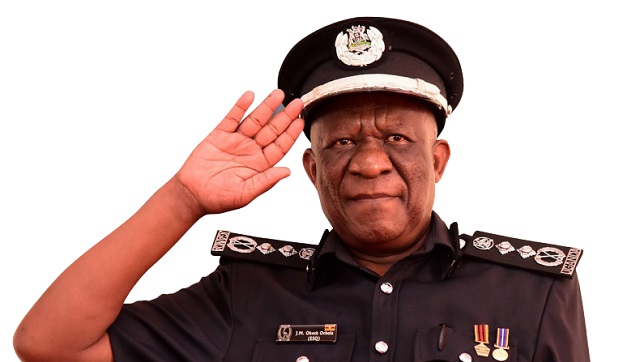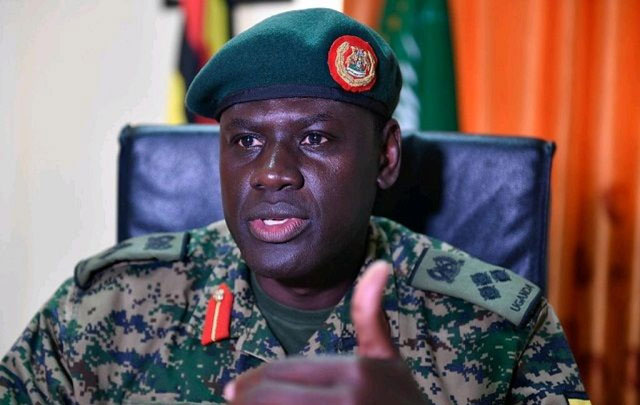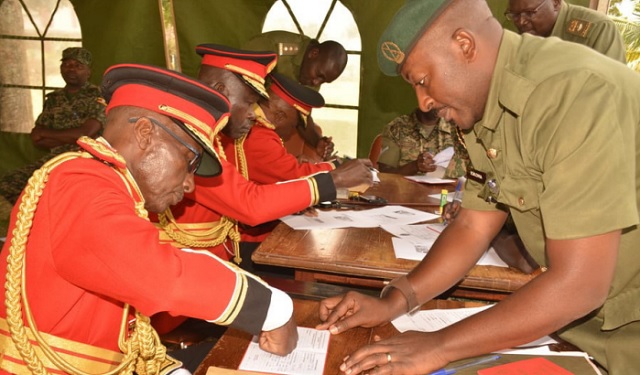
The tenure of the long serving police officer reveals the complexities of reform, power dynamics, and the ongoing struggle for security in a rapidly changing nation
COVER STORY | IAN KATUSIIME | When Martin Okoth Ochola was appointed Inspector General of Police six years ago, there was some relief from the public after all the tumult presided over by his predecessor Gen. Kale Kayihura. Ochola made some immediate changes: he ordered a census of the police force, disbanded the Flying Squad Unit, transferred officers, ordered an audit for all guns, and fired warning shots at some of Kayihura’s creations like the Crime Preventers which had become attached to the Police force.
Being a career police officer, there were expectations on Ochola’s shoulders because the image of the police had been tainted by Kayihura’s military style and how he defined his mission. Police brutality during protests, corruption of officers, and the naked partisanship where the police put ruling party interests ahead of law enforcement.
Ochola won some plaudits from the public and the press when he ordered the closure of a torture facility; the Nalufenya police station in Jinja, and for actions like firing rogue officers who were implicated in several crimes.
Ochola’s boldest moves were seen in the key personnel changes he made. He immediately dropped Frank Mwesigwa as Commander Kampala Metropolitan Police, a top Kayihura lieutenant, and sent him to head the Tourism Police.
Mwesigwa was part of a crop of officers that joined the force in Kayihura’s time and were reportedly getting assignments ahead of old-guard career officers like Ochola who had joined much earlier before President Yoweri Museveni started entrusting the military to run Uganda Police Force.
Ochola surged on with his reforms for months but within time his revolution hit a wall. As he came to realise, power was concentrated in the hands of his younger deputy; Brig. Sabiiti Muzeyi with whom they were appointed at the same time.
For Ochola, what had happened when he was deputy IGP under the larger-than-life Kayihura, was now happening again when he was IGP. He took a back seat and accepted the hand that he had been dealt.
Museveni unceremoniously fired Sabiiti in 2020 over his style of managing election protests. “Anyone who cannot defend the people should go home and rear goats,” Museveni said after sacking Sabiiti.
He replaced him with the maverick Maj. Gen. Paul Lokech dubbed Lion of Mogadishu whose domineering style ran roughshod over the entire Police Force.
IGP Ochola was outshined and sometimes undermined by the two. The IGP had built a reputation for his hands-off style where he would preside over police like a provincial governor. Ochola had since made peace with Museveni’s command structure where deputies from the military were the de facto police chiefs in the country.
Ochola’s journey was reflected in his speech on March 4, exactly six years after his appointment as IGP was made. Ochola was speaking at the Police headquarters in Naguru while bidding farewell to the force he had served for almost the entirety of Museveni’s era. “On 2nd January 2024, I made a service record of 36 years in the Uganda Police Force, having joined the institution on January 2, 1988.”
He added, “Within this period, which was climaxed by my appointment as Inspector General of Police, I was particularly fortunate to have served as Deputy IGP, Director of Special Duties, Director CID, Deputy Director CID, Commissioner of Legal Department, Head Complaints Desk, Head Prosecution, and OC Entebbe Aviation Security.”
Ochola said when he took up the job in 2018, the task was clear: “professionalizing and rebuilding the image of the institution.” His task could not have been more difficult because a year ago, President Museveni had rebuked Ochola’s predecessor, Kayihura saying “The Police is full of criminals.” This was after the killing of the Police spokesperson AIGP Felix Kaweesi by unknown assailants as he left his home in March 2017. A year later, Kayihura was fired.
The 65-year-old Ochola told the officers at his sendoff ceremony that through teamwork and guidance from the President and Ministry of Internal Affairs, the police was able to “register numerous achievements in policing, as well as creating a general atmosphere of calmness, togetherness, and a sense of belonging we are witnessing today.”
But in reality, the Commander in Chief preferred his men from the UPDF to run the police. Since 2001 when Museveni appointed then Maj. Gen. Katumba Wamala as Police Chief, it has been the brief. When Kayihura took over, it became a fully-fledged military affair as he went on to run the force for 13 years.

Kayihura also set about recruiting his cadres and sidelined career officers like Deputy IGP Julius Odwee. When he was retiring in 2011, Odwee did not have kind words for the Police leadership under Kayihura. It was at the time of the walk-to-work protests and there were concerns that the Police was getting heavily militarized.
Odwee kept granting interviews where he dished out criticism for Kayihura. According to analysts, Ochola’s retirement marks the end of an era for career officers who preferred old policing models compared to the era where police prioritized breaking up opposition rallies and luring government opponents with cash, threats and intimidation.
One of the notable times when Ochola interacted with President Museveni publicly was in 2019 during a Police Council meeting at Police headquarters in Naguru. Ochola had requested for more personnel to deal with the rising challenges of insecurity.
Even at the time of the 2021 presidential election when Bobi Wine’s presidential election had thrown the security establishment into panic with the protests following his arrests, Ochola was a no-show. To make matters worse for him, President Museveni appointed Lt. Gen. Muhanga Kayanja as in charge of all security a few days to the election further wallowing the IGP’s authority.
With time, however, the Police appeared overwhelmed with challenges regardless of Ochola’s authority or the lack of it. Attacks on police stations and shootings in the city became the norm despite the routine changes at the top.
Police attacks
The attack on Kyanja Police Post in November 2022 was as daring as they come: assailants riding on motorbikes and firing rounds of bullets at the station with the intent of capturing guns. The assailants were repulsed and did not manage to capture any rifle but the attack followed a similar pattern in recent days. With the third attack in four months, the fear and anxiety was palpable.
A fortnight earlier, assailants raided Busiika Police Station in Luweero district, 65km from Kampala. In Busiika, the thugs, numbering six to eight and armed with machetes, hacked two police officers to death and fled with two guns. They left two other police officers injured.
Reports said the assailants dropped one of the guns after the raid leaving residents and authorities wondering about their actual motive.
Enter Katsigazi
The Deputy Inspector General of Police Maj. Gen. Geoffrey Katsigazi visited Busiika shortly after where the second attack in three months, has confounded residents and exposed security frailties. He met security and area leaders in a general reconnaissance modus operandi. The attacks had become typical of what was happening in Kampala.

Katsigazi’s visit also came at a time of a great debate on a directive from the Commander in Chief, President Museveni, to shut down police posts in rural areas and have one major police station at the sub-county level. Katsigazi doubled down on the move. “The police posts will remain closed. We are not reopening them,” he told journalists after a security meeting in Busiika.
He added, “Some of the police posts had only three personnel and that was very dangerous. We shall now have a minimum of fifteen personnel equipped with motorcycles and other vehicles.”
Katsigazi’s policing strategy is not unlike that of his now ex-boss Ochola. Katsigazi prefers to operate quietly behind the scenes. He visited Busiika two weeks after the deadly raid on the police post when tensions had tamped down- perhaps in a bid to have calm, reflective meetings with an agitated populace demanding answers.
Katsigazi’s management style is markedly different from his high-profile predecessors; Maj. Gen. Sabiiti Muzeyi and Lokech, who were well-known figures before they were brought into the police force.
Lokech in his brief eight-month stint perhaps had even more impact than Sabiiti who was deputy IGP for close to three years. He was said not to read Ochola in on major decisions. Lokech took over the investigation and manhunt of the suspects involved in the attempted assassination of Gen. Katumba Wamala, Works Minister in June 2021.
He commanded night raids where some suspects were shot dead and he briefed journalists on every detail of it. Displaying the mug shots of the suspects and the guns to the media, Lokech appeared to be fully in charge of his investigation where he kept the identity of his operatives unknown. The detectives who displayed the guns were fully masked and donning black colors.
Lokech was a reincarnation of Kayihura to some observers, albeit with more attention to detail as he broke down the grittiest of details like cartridges used in a crime. Lokech, a soldier with stints as commander of Ugandan troops in South Sudan and Somalia seemed to be the perfect for being Police Chief in Museveni’s calculation. However, Lokech died mysteriously in his home in August 2021 from a reported blood clot. A day before he died, Lokech had effected sweeping transfers that affected senior officers like Regional Police Commanders some at the rank of Commissioner of Police. However, the transfers were reversed just hours after Lokech died adding to the mystery.
As Ochola bows out and Katsigazi takes over in an acting capacity, the Uganda Police Force remains with enormous challenges; the killings in Greater Masaka, motorcycle hit men, armed robberies, rampant guns, and corruption and abuse of office in its ranks.
Allied Democratic Forces (ADF) is still wreaking havoc in Uganda with random attacks making it even more dangerous. The police still has an unwritten order to enforce crackdowns on the opposition–hollowing out vital security functions like intelligence gathering and emergency response. It is now up to the Commander in Chief on his next move.
 The Independent Uganda: You get the Truth we Pay the Price
The Independent Uganda: You get the Truth we Pay the Price


